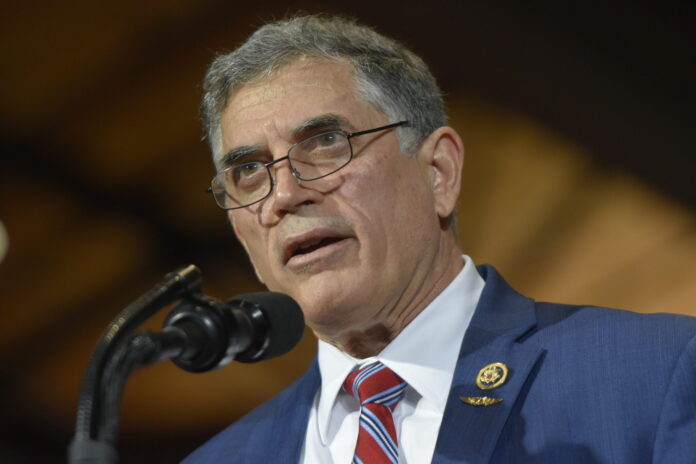
WASHINGTON (States Newsroom) — Republicans suffered a major setback to their “big, beautiful bill” on Friday, when amid conservative objections the U.S. House Budget Committee failed to approve the measure, a crucial step in the process.
In a 16-21 vote, Reps. Andrew Clyde of Georgia, Josh Brecheen of Oklahoma, Ralph Norman of South Carolina, Chip Roy of Texas and Lloyd Smucker of Pennsylvania broke from their GOP colleagues to block the bill from moving toward the floor, demanding changes to several provisions.
The breakdown over the 1,116-page bill marks an escalation in the long-running feud between centrist Republicans, who have been cautious about hundreds of billions in spending cuts to safety net programs, and far-right members of the party, who argue the changes are not enough.
The committee could return later to take up the bill again, though it was not immediately clear when that might be. House Speaker Mike Johnson of Louisiana has said he wants it on the floor prior to the Memorial Day recess.
Speedier work requirements
Norman said he remains a “hard no” until new work requirements for Medicaid recipients phase in more quickly. As the bill is written, the requirements won’t begin until 2029.
“To phase this in for four years — We’re telling a healthy-bodied, a healthy American that you got four years to get a job. No, your payment stops now,” Norman said.
Brecheen criticized the bill for not going far enough to repeal wind and solar energy tax credits, which he contends are “undermining natural gas jobs.”
“We have to fix this,” he said.
Clyde denounced the measure for not adhering to President Donald Trump’s promise of “right-sizing government,” as Clyde described it. The Georgia Republican also pleaded for lower taxes on firearms and stronger cuts that would put Medicaid on a “sustainable path.”
“Unfortunately, the current version falls short of these goals and fails to deliver the transformative change that Americans were promised,” Clyde said.
Smucker initially voted ‘yes,’ but then joined his four colleagues to oppose the measure.
Trump wrote on his social media platform shortly before the committee voted that “Republicans MUST UNITE behind, ‘THE ONE, BIG BEAUTIFUL BILL!’”
“We don’t need ‘GRANDSTANDERS’ in the Republican Party. STOP TALKING, AND GET IT DONE! It is time to fix the MESS that Biden and the Democrats gave us. Thank you for your attention to this matter!”
‘A wrecking ball to Medicaid’
Democrats, who as expected unified in voting no against the bill, slammed it as “ugly,” “cruel” and a “betrayal.”
“This bill takes a wrecking ball to Medicaid, on which 1 in 5 Americans and 3 million Ohioans depend for medical care — children, seniors in nursing homes,” said Rep. Marcy Kaptur, who represents northern Ohio. “Please come with me to visit the nursing homes. … Perhaps too many on the other side of the aisle have not had to endure a life that has major challenges.”
Rep. Ilhan Omar of Minnesota said the proposed cuts to safety net programs would be “devastating.”
“Their changes will kick millions of Americans off their health care and nutrition assistance. That means more untreated illnesses, more hungry children, more preventable deaths,” she said.
Republican-only bill
Republicans are using the complex reconciliation process to move the package through Congress with simple majority votes in each chamber, avoiding the Senate’s 60-vote legislative filibuster, which would otherwise require bipartisanship.
Reconciliation measures must address federal revenue, spending, or the debt limit in a way not deemed “merely incidental” by the Senate parliamentarian. That means the GOP proposals must carry some sort of price tag and cannot focus simply on changing federal policy.
Republicans are using the package to extend the 2017 tax law, increase spending on border security and defense by hundreds of billions of dollars, overhaul American energy production, restructure higher education aid and cut spending.
The 11 House committees tasked with drafting pieces of the legislation have all debated and approved their measures along party lines.
The Agriculture Committee, Energy and Commerce Committee and Ways and Means Committee all completed their work earlier this week, amid strong objections from Democrats.
Proposed changes to the Supplemental Nutrition Assistance Program, or SNAP, could shift considerable cost-sharing onto states for the first time, presenting challenges for red-state lawmakers who need to explain the bill back home.
More than $600 billion in federal spending cuts to Medicaid during the next decade could also cause some difficulties for moderate Republicans, some of whose constituents are likely to be among the millions of Americans expected to lose their health insurance.
Republicans also have yet to reach an agreement on the state and local tax deduction or SALT, a priority for GOP lawmakers from blue states like California, New Jersey and New York.
The Budget Committee’s role in the process was to package together all of the bills and then send the one massive bill to the Rules Committee, the last stop before floor debate for major legislation.
That won’t be able to happen until after GOP leaders get nearly all the Republican lawmakers on the panel to support the package.







